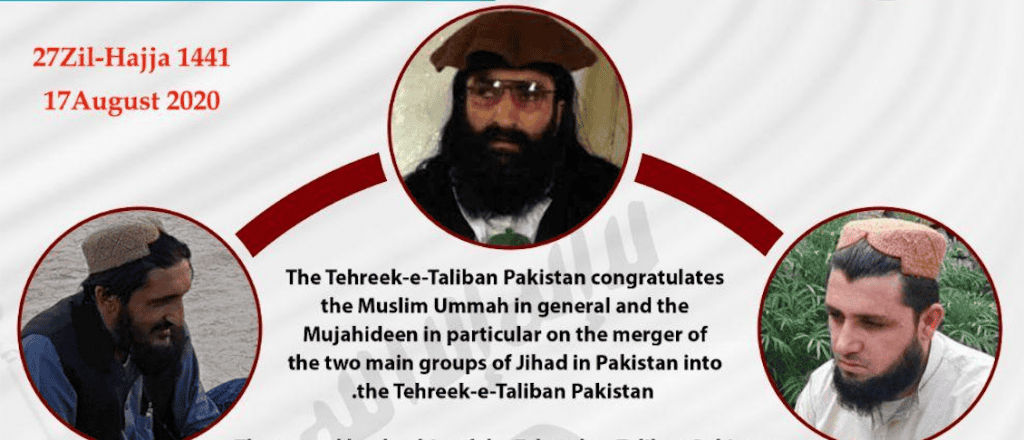
The Pakistani Taliban announced today that two splinter factions, Jamaat-ul-Ahrar (JuA) and Hizb-ul-Ahrar (HuA), have rejoined the organization. The group trumpeted the reunification in a statement released on its official media sites.
Both Omar Khalid Khorasani (the leader of JuA) and Omar Khorasani (the head of HuA) have “pledged allegiance” to the emir of the Pakistani Taliban, Noor Wali Mehsud, according to the statement. Their oath of fealty is for “emigration and Jihad.”
Noor Wali was named the overall leader of the Pakistani Taliban in June 2018, shortly after his predecessor, Mullah Fazlullah, was killed in a U.S. drone strike in the eastern Afghan province of Kunar. Wali, also known as Abu Mansoor Asim, is a veteran jihadist who fought alongside the Afghan Taliban against the Northern Alliance, as well as against the U.S. and its allies after the Oct. 2001 invasion.
The Pakistani Taliban (also known as the Movement of the Taliban in Pakistan and Tehreek-e-Taliban Pakistan, or TTP) has long been a coalition of jihadist groups operating in both Afghanistan and Pakistan. Due to personality and leadership disputes, as well as other problems, the organization’s composition has changed through the years. Even though the group officially rejected the Islamic State’s caliphate claim, some of its members and midlevel commanders defected.
However, the Pakistani Taliban’s internal dynamics are not always clear. Omar Khalid Khorasani, the JuA emir, reportedly reunited with the Pakistani Taliban in 2015. Apparently, that did not take, at least not completely, and another official merger was necessary.
“The central leadership of the Tehreek-e-Taliban Pakistan has been making efforts to unite all the groups, who are individually fighting the tyrannical system in Pakistan, by solving their issues so that the Jihad in Pakistan and efforts to establish Shariah can be strengthened,” the group’s statement reads. “All praise belongs to Allah that they have succeeded in this goal to a great extent and are further determined to carry on with their efforts.”
Both Omar Khalid Khorasani (JuA) and Omar Khorasani (HuA) have proclaimed an “end” to “their former groups,” while vowing that “they and their associates would abide by the Shariah rules and principles of the” Pakistani Taliban.
In turn, Noor Wali and his men “welcomed them as usual and the armed Mujahideen present during the pledge greeted them with light and heavy weapons,” according to the group’s statement.
The Pakistani Taliban hopes that the joint venture will encourage others to unify for jihad against parts of the Pakistani state. The group says it “invites wholeheartedly all groups affiliated with Jihad in Pakistan towards unity and to carry out their struggle by uniting with the TTP instead of fighting individually.” Noor Wali’s men “also send a message to the enemy that this holy Jihad of ours will continue till the false tyrannical system is eradicated from Pakistan and the oppressed are freed from the clutches of the oppressor.”
The Pakistani Taliban has been designated as a terrorist organization by the U.S. and the United Nations. Under one of its previous emirs, Hakeemullah Mehsud, it was responsible for the failed May 2010 car bombing in New York City’s Times Square.
Noor Wali Mehsud was designated as a terrorist by the U.S. government and U.N.
JuA, which initially broke away from the Pakistani Taliban in 2014, has been designated as well. In 2016, the State Department noted that JuA is “based in the Afghanistan-Pakistan border region” and “has staged multiple attacks in the region targeting civilians, religious minorities, military personnel, and law enforcement.” The JuA is “responsible for the killing of two Pakistani employees of the U.S. Consulate in Peshawar in early March 2016,” as well as a “suicide assault” at an amusement park in Lahore that same month. The latter attack “killed more than 70 people,” “nearly half of them women and children,” and also “injured hundreds more.”
It is possible that al Qaeda played a role in the newly announced unification efforts. Dual hatted al Qaeda operatives have done just that in the past. And the Pakistani Taliban continues to advertise its ties to both al Qaeda and the Afghan Taliban.







